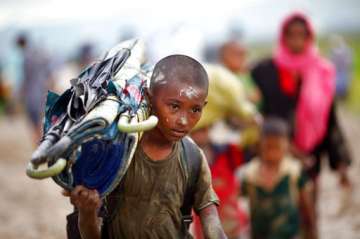Myanmar military says death toll in clashes almost 400
The statement said there had been 90 armed clashes including an initial 30 attacks by insurgents on Aug. 25, making the combat more extensive than previously announced.

Myanmar's military says almost 400 people have died in recent violence in the western state of Rakhine triggered by attacks on security forces by insurgents from the Rohingya ethnic minority.
The numbers, posted Friday on the Facebook page of the country's military commander, are a sharp increase over the previously reported toll of just over 100. The statement said all but 29 of the 399 dead were insurgents, whom it described as terrorists.
The statement said there had been 90 armed clashes including an initial 30 attacks by insurgents on Aug. 25, making the combat more extensive than previously announced.
The army, responding to the Aug. 25 attacks, launched what it called clearance operations against the insurgents. Advocates for the Rohingya, an oppressed Muslim minority in overwhelmingly Buddhist Myanmar, say security forces attacked and burned Rohingya villages, shooting civilians and causing others to flee. Hundreds of civilians have been killed, they say.
Tens of thousands have fled into neighboring Bangladesh, an exodus that continued Friday.
Bangladeshi border guards have tried to keep them out, but thousands could be seen Friday making their way across muddy rice fields.
Young people helped carry the elderly, some on makeshift stretchers, and children carried newborns.
Some, carrying bundles of clothes, cooking utensils and small solar panels, said they had walked at least three days to get to the border.
Sham Shu Hoque, 34, crossed the border with 17 family members. He said he left his village of Ngan Chaung on Aug. 25 after it was attacked by Myanmar security forces who shot at the villagers. He said troops also used rocket-propelled grenades, and helicopters fired some sort of incendiary device.
Five people were killed in front of his house, he said. His family survived the attack but was told by the soldiers to leave. They took a week to reach Bangladesh, hiding in villages along the way, he said.
Most of Myanmar's estimated 1 million Rohingya live in northern Rakhine state. They face severe persecution, with the government refusing to recognize them as a legitimate native ethnic minority, leaving them without citizenship and basic rights.
Longstanding tension between the Rohingya Muslims and ethnic Rakhine Buddhists erupted in bloody rioting in 2012. The insurgent group that claimed responsibility for last week's attacks, the Arakan Rohingya Salvation Army, said it acted to protect Rohingya communities.
The U.S. group Human Rights Watch said it has obtained satellite images that suggest burning villages across a large swathe of Rakhine state. It said the locations match some of the accounts given by refugees who have fled into Bangladesh of settlements that have been attacked and destroyed by Myanmar soldiers, police and armed civilians.
"The government has to stop this offensive," said Phil Robertson, deputy Asia director for Human Rights Watch. "It has to allow humanitarian assistance and let journalists into this area. We have to actually see what's happened because quite clearly human rights violations have taken place."
He said it was possible the violations had occurred on both sides.
"There has to be some sort of de-escalation," he said.